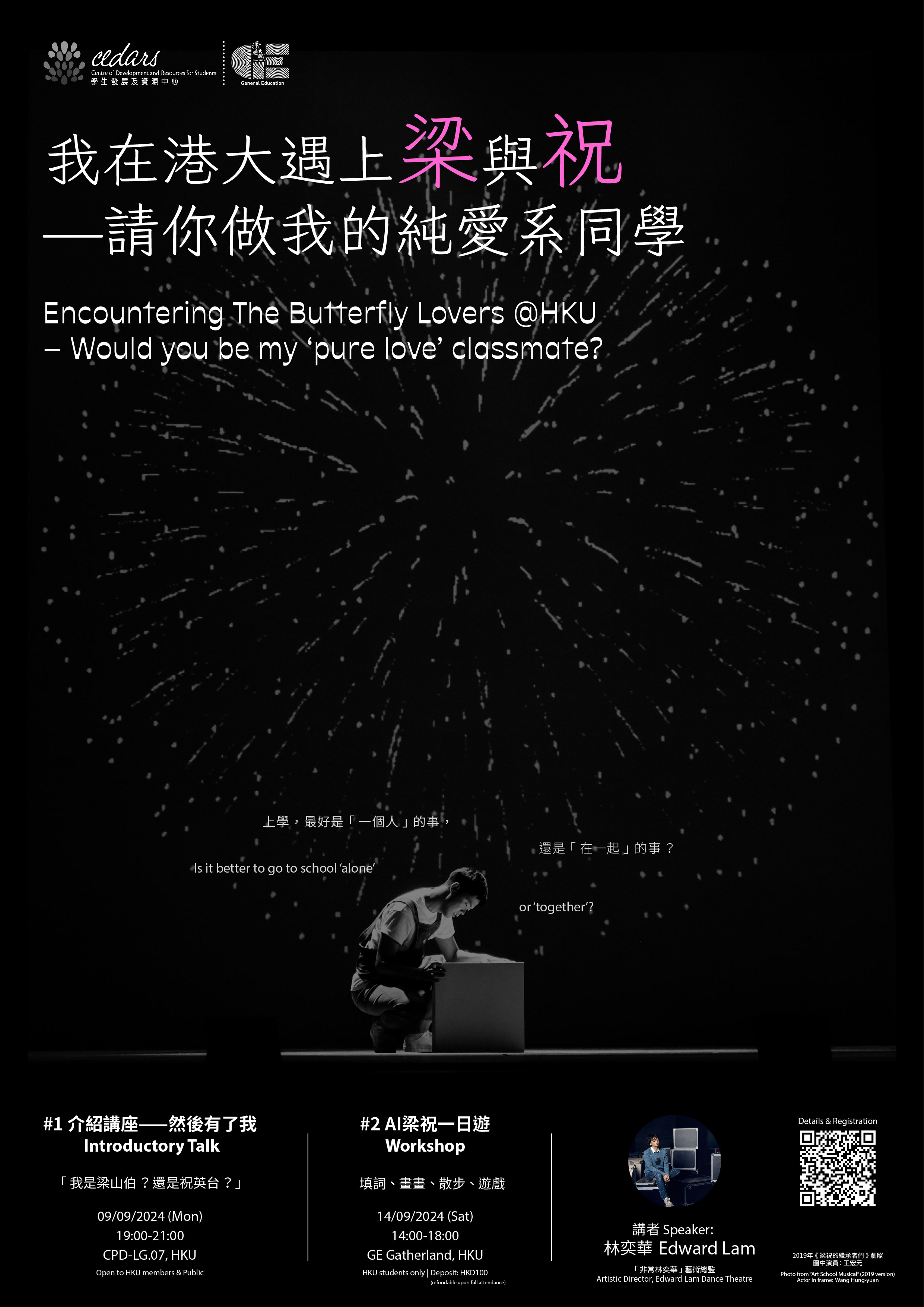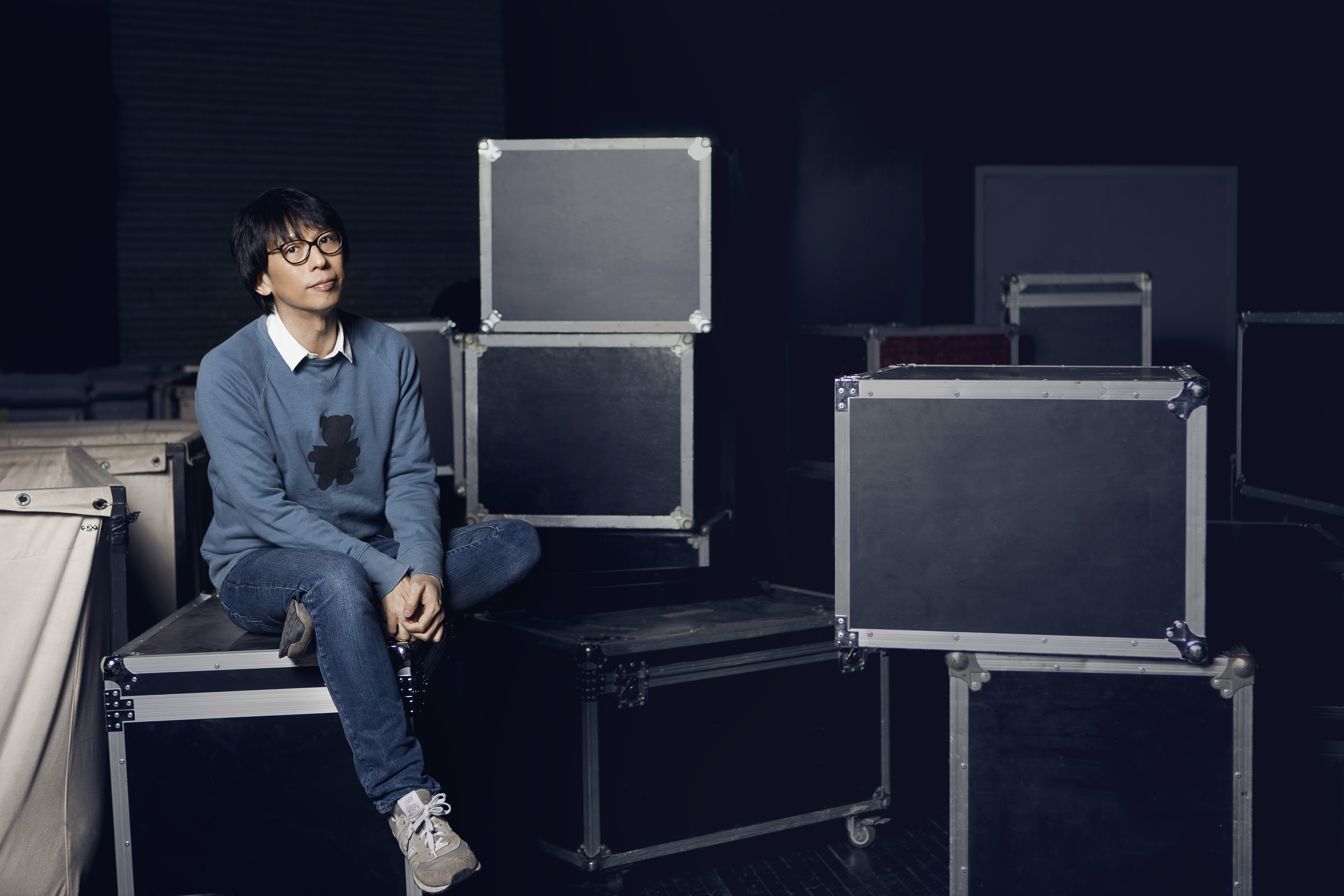
GE2024-05
Encountering The Butterfly Lovers @HKU – Would you be my ‘pure love’ classmate?
我在港大遇上梁與祝—請你做我的純愛系同學
我在港大遇上梁與祝—請你做我的純愛系同學
上學,最好是「一個人」的事,還是「在一起」的事?
三年疫情,等於沒有了三年的學校生活,有一種心境,便在日後陪伴著很多人,它叫「在一起地一個人」。
人會被環境改變,人工智能(AI)的發展更加快改變的步伐。這令原本一天天累積,一步步發現的學習形態,已然過去,連帶人對彼此的好奇心都愈來愈淡化。上學校的意義因而成為問號:同學的「學」,是不是因為「同」失去了興趣?甚至,連對自己也一樣?
但,人的經驗,不就是AI 在幫助我們之前所汲取的「營養」嗎?如果這系統「有出冇入」,就像,每個人都在要求答案,卻沒有人想問問題,這對未來,將有怎樣的影響?
或者,也像人人都想被愛,那還有誰會付出愛?
「同學」的可貴,在於人生能有一個階段把自己像一本筆記那樣打開。AI 其實也可以是一個「同學」,通過學習的分享,留下在一起過的痕跡,同學的「同」,是身份上的相同,而不是同質性的「同」。「學」不只是增進學識,而是在一起看不完的風景、聊不完的天、散不完的步。
所以所學的是甚麼不是最重要,「有發生過」才最重要。
AI 不可能代替我們的經歷,但我們可以借助AI 使將來的路走得更遠。
例子之一,民間傳奇「梁山伯與祝英台」是兩個同學的故事。故事中的梁山伯,不論祝英台用甚麼「謎語」試讓他明白自己是誰,他都總是抗拒投入猜和想。千年之後的今天,如果人人都是梁山伯,祝英台是不是就要學習如何成為AI ?
有說,「初戀是最後的戀愛,最後的戀愛是初戀」。你今天與同學散過步了嗎?
Is it better to go to school "alone" or "together"?
The three-year epidemic implies losing three years of school life, leaving a lasting state of mind that will accompany many people in the future. It is called ‘together alone’.
People will be changed by the environment, and artificial intelligence (AI) accelerates the change. This has made the learning pattern that was accumulated day by day and discovered step by step has passed, and people's curiosity about each other has become increasingly diluted. The meaning of going to school has therefore become a question mark: Have classmates lost interest in ‘learning’ because they are ‘same’? Even to yourself?
But isn’t human experience the ‘ingredients’ that AI draws from before it helps us? If this system is ‘failed’, as if everyone is asking for answers but no one is asking questions, what impact will this have on the future?
Or, just like everyone wants to be loved, but who will offer love?
The value of ‘classmates’ lies in the fact that there is a stage in life when you can open yourself up like a notebook. AI could possibly be a ‘classmate’. Through sharing of learning, traces of the time spent together are left behind. The ‘sameness’ of classmates is the sameness in identity, not the ‘sameness’ of homogeneity. ‘Learning’ is not just about improving knowledge, but about endless sightseeing, endless chatting, and endless walking together.
So what you learn is not the most important, but ‘it happened’ is the most important.
AI cannot replace our experience, but we can use AI to go further in the future.
One example, the folk legend Liang Shanbo and Zhu Yingtai is the story of two classmates. Liang Shanbo in the story, no matter what "riddles" Zhu Yingtai used to try to make him understand who he was, he always resisted guessing and thinking. Today, thousands of years later, if everyone is Liang Shanbo, will Zhu Yingtai have to learn how to become an AI?
It is said, ‘First love is the last love, and the last love is the first love’. Have you gone on a walk with your classmates today?
GE2024-05A
#1 介紹講座——然後有了我 Introductory Talk
「我是梁山伯?還是祝英台?」“Am I Liang Shanbo or Zhu Yingtai?”
日期 Date: 09/09/2024 (Mon)
時間 Time: 19:00-21:00
地點 Venue: CPD-LG.07, LG/F, Centennial Campus, HKU
語言 Language: 粵語及普通話 Cantonese & Putonghua (Simultaneous interpretation in English will be provided upon request by 2/9)
報名 Registration (Talk): 港大學生及職員 HKU Students & Staff
報名 Registration (Talk): 公衆及校友 Public & Alumni
GE2024-05B
#2 AI 梁祝一日遊 Workshop
填詞、畫畫、散步、遊戲 Writing Lyrics, Drawing, Walking, Playing Games
(工作坊過程會被拍攝紀錄,拍攝影像日後有可能會於網上或其他形式放映。 The workshop will be recorded, and the footage may be shown online or in other forms in the future.)
日期 Date: 14/09/2024 (Sat)
時間 Time: 14:00-18:00
地點 Venue: GE Gatherland 240 (MB240, 2/F, Main Building)
語言 Language: 粵語及普通話 Cantonese & Putonghua
名額 Quota: 20
按金 Deposit: HK$80 (refundable upon full attendance of the workshop)
截止報名日期 Application Deadline: 17:00, 11/09/2024 (Wed)
報名 Registration (Workshop):
只限港大學生 HKU Students only – https://onlinepytsysprd.feo.hku.hk/event/110943?code=556a3e34a3274084b258bb752615e917

三年疫情,等於沒有了三年的學校生活,有一種心境,便在日後陪伴著很多人,它叫「在一起地一個人」。
人會被環境改變,人工智能(AI)的發展更加快改變的步伐。這令原本一天天累積,一步步發現的學習形態,已然過去,連帶人對彼此的好奇心都愈來愈淡化。上學校的意義因而成為問號:同學的「學」,是不是因為「同」失去了興趣?甚至,連對自己也一樣?
但,人的經驗,不就是AI 在幫助我們之前所汲取的「營養」嗎?如果這系統「有出冇入」,就像,每個人都在要求答案,卻沒有人想問問題,這對未來,將有怎樣的影響?
或者,也像人人都想被愛,那還有誰會付出愛?
「同學」的可貴,在於人生能有一個階段把自己像一本筆記那樣打開。AI 其實也可以是一個「同學」,通過學習的分享,留下在一起過的痕跡,同學的「同」,是身份上的相同,而不是同質性的「同」。「學」不只是增進學識,而是在一起看不完的風景、聊不完的天、散不完的步。
所以所學的是甚麼不是最重要,「有發生過」才最重要。
AI 不可能代替我們的經歷,但我們可以借助AI 使將來的路走得更遠。
例子之一,民間傳奇「梁山伯與祝英台」是兩個同學的故事。故事中的梁山伯,不論祝英台用甚麼「謎語」試讓他明白自己是誰,他都總是抗拒投入猜和想。千年之後的今天,如果人人都是梁山伯,祝英台是不是就要學習如何成為AI ?
有說,「初戀是最後的戀愛,最後的戀愛是初戀」。你今天與同學散過步了嗎?
Is it better to go to school "alone" or "together"?
The three-year epidemic implies losing three years of school life, leaving a lasting state of mind that will accompany many people in the future. It is called ‘together alone’.
People will be changed by the environment, and artificial intelligence (AI) accelerates the change. This has made the learning pattern that was accumulated day by day and discovered step by step has passed, and people's curiosity about each other has become increasingly diluted. The meaning of going to school has therefore become a question mark: Have classmates lost interest in ‘learning’ because they are ‘same’? Even to yourself?
But isn’t human experience the ‘ingredients’ that AI draws from before it helps us? If this system is ‘failed’, as if everyone is asking for answers but no one is asking questions, what impact will this have on the future?
Or, just like everyone wants to be loved, but who will offer love?
The value of ‘classmates’ lies in the fact that there is a stage in life when you can open yourself up like a notebook. AI could possibly be a ‘classmate’. Through sharing of learning, traces of the time spent together are left behind. The ‘sameness’ of classmates is the sameness in identity, not the ‘sameness’ of homogeneity. ‘Learning’ is not just about improving knowledge, but about endless sightseeing, endless chatting, and endless walking together.
So what you learn is not the most important, but ‘it happened’ is the most important.
AI cannot replace our experience, but we can use AI to go further in the future.
One example, the folk legend Liang Shanbo and Zhu Yingtai is the story of two classmates. Liang Shanbo in the story, no matter what "riddles" Zhu Yingtai used to try to make him understand who he was, he always resisted guessing and thinking. Today, thousands of years later, if everyone is Liang Shanbo, will Zhu Yingtai have to learn how to become an AI?
It is said, ‘First love is the last love, and the last love is the first love’. Have you gone on a walk with your classmates today?
GE2024-05A
#1 介紹講座——然後有了我 Introductory Talk
「我是梁山伯?還是祝英台?」“Am I Liang Shanbo or Zhu Yingtai?”
日期 Date: 09/09/2024 (Mon)
時間 Time: 19:00-21:00
地點 Venue: CPD-LG.07, LG/F, Centennial Campus, HKU
語言 Language: 粵語及普通話 Cantonese & Putonghua (Simultaneous interpretation in English will be provided upon request by 2/9)
報名 Registration (Talk): 港大學生及職員 HKU Students & Staff
報名 Registration (Talk): 公衆及校友 Public & Alumni
GE2024-05B
#2 AI 梁祝一日遊 Workshop
填詞、畫畫、散步、遊戲 Writing Lyrics, Drawing, Walking, Playing Games
(工作坊過程會被拍攝紀錄,拍攝影像日後有可能會於網上或其他形式放映。 The workshop will be recorded, and the footage may be shown online or in other forms in the future.)
日期 Date: 14/09/2024 (Sat)
時間 Time: 14:00-18:00
地點 Venue: GE Gatherland 240 (MB240, 2/F, Main Building)
語言 Language: 粵語及普通話 Cantonese & Putonghua
名額 Quota: 20
按金 Deposit: HK$80 (refundable upon full attendance of the workshop)
截止報名日期 Application Deadline: 17:00, 11/09/2024 (Wed)
報名 Registration (Workshop):
只限港大學生 HKU Students only – https://onlinepytsysprd.feo.hku.hk/event/110943?code=556a3e34a3274084b258bb752615e917

Schedule:
| Date | Time | Venue |
| 09 Sep 2024 | 19:00 - 21:00 | CPD-LG.07, LG/F, Centennial Campus, HKU |
| 14 Sep 2024 | 14:00 - 18:00 | GE Gatherland 240 |
Bio of Instructor(s) 導師簡介:
 | Edward Lam 林奕華 Artistic Director, Edward Lam Dance Theatre 「非常林奕華」藝術總監,劇場導演。至今編導超過60齣原創作品。香港藝術發展獎藝術家年獎(戲劇)得主,並分別憑《男人與女人之戰爭與和平》、《紅娘的異想世界之在西廂》、《紅樓夢》三獲上海現代戲劇谷「壹戲劇大賞」年度最佳導演獎。2016年台灣《PAR表演藝術》雜誌出版第一本研究林奕華導演作品的著作《Who’s Afraid of 林奕華:在劇場,與禁忌玩遊戲》(徐硯美著)。1997年開始主持港大通識課程。 Artistic Director and Theatre Director of the Edward Lam Dance Theatre, Lam founded Zuni Icosahedron with friends in the early 1980s, and established the Edward Lam Dance Theatre during his residence in London (1989 to 1995). Since returning to Hong Kong in 1995, he has devoted himself to the theatre and has directed 64 original works. Lam was awarded “Best Director” at “Modern Drama Valley’s One Drama Awards” for his works, Men and Women, War and Peace (2010), The Doppelgänger (2012), and What is Sex? (2017), and was named “Artist of the Year” (Theatre) by the Hong Kong Arts Development Council in 2017. His musical theatre piece, Art School Musical (2014) has toured over a dozen cities in Asia, and had its fourth rerun in Hong Kong at Freespace in October 2019. Books of Lam’s collected essays include Waiting For Hong Kong, The Meaning Of Entertainment, Evil But Glamorous, My TV Dinner Years, and Leading Ladies In The Mandarin Cinema. Who Is Afraid Of Edward Lam? Alexander Hsu’s analysis of Lam’s stage works from 2006 to 2015, was published by Performing Arts Review in Taiwan (2016). |


